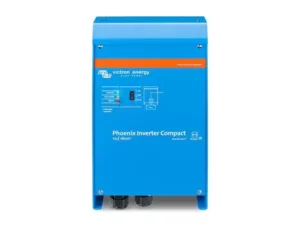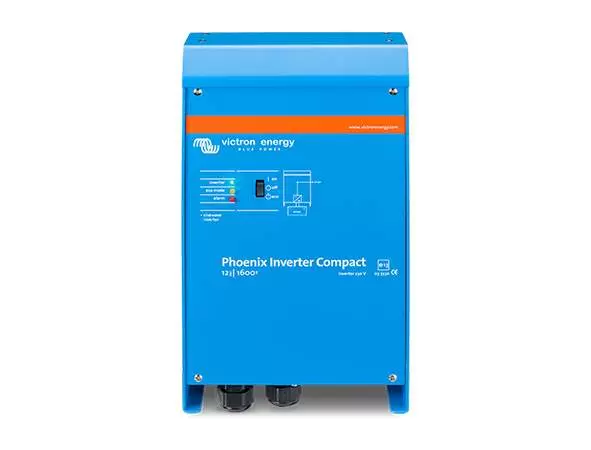When it comes to powering your recreational vehicle (RV) or home, you may wonder what the difference is between RV and PV inverters. Both types of inverters play an essential role in providing clean, reliable power, but there are some critical distinctions between the two that you should understand. In this blog post, we will take a closer look at how RV inverters differ from PV inverter and the advantages and disadvantages of each type of inverter. By the end of the post, you’ll better understand which type of inverter is best suited to your needs.
Power Output
Regarding RV and PV inverters, one of the key differences is the power output. RV inverters are typically designed for smaller power loads, such as charging phones, running lights, and powering small appliances like a toaster or microwaves. On the other hand, PV inverters are designed to handle larger power loads, such as powering an entire house or business.
RV inverters typically have a lower wattage range, with most models producing between 300-3000 watts. PV inverters, on the other hand, can make upwards of 10,000 watts or more. This difference in power output is due to the intended use of the inverters – an RV inverter is meant to provide power for smaller appliances. In contrast, an inverter is intended to power entire buildings or even a small city.
It’s important to note that the power output of an inverter can also impact its efficiency and cost, which we’ll dive into more in the following sections.
 Voltage
Voltage
Another critical difference between RV and PV inverters is the voltage they can handle. RV inverters are designed to work with various battery types and voltage levels, typically ranging from 12V to 48V DC. As a result, RV owners can use different battery configurations to meet their power needs.
In contrast, PV inverters are specifically designed to convert the high-voltage DC power generated by solar panels into grid-compatible AC power. As a result, they typically operate at much higher voltages than RV inverters, ranging from 600V to 1000V DC. This is necessary for grid-tied solar systems, which require high-voltage DC power to be converted into AC power for homes and businesses.
It’s worth noting that some hybrid inverters are available that can handle both RV and PV applications. These inverters are designed to work with a wide range of battery types and voltages, as well as high-voltage DC power from solar panels. So a hybrid inverter may be a good choice if you plan on using RV and solar power.
Overall, regarding voltage, RV and PV inverters have different requirements. RV inverters must be versatile enough to work with various battery types and voltage levels. In contrast, PV inverters require high-voltage DC input to generate AC power for grid-tied solar systems. Choose the suitable inverter for your application to ensure safe and efficient operation.
Size Of RV Inverter
Another critical difference between RV and PV inverters is their size. RV inverters tend to be smaller and more compact, as they must fit into the limited space available in an RV or camper van. They may also be portable, so they can be quickly taken on the go.
PV inverters, on the other hand, tend to be larger and more stationary. In addition, they are often mounted on the side of a building or a pole outside and must withstand outdoor conditions. As a result, they are typically bulkier and heavier than RV inverters.
The size of RV inverter can also impact its power output and efficiency. In general, larger inverters can handle more power and are more efficient than smaller ones. However, they may not be practical or necessary for smaller systems like those used in RVs.
Ultimately, the size of your inverter will depend on your specific needs and the space available for installation. When choosing an inverter, consider the size and power output to ensure it is the right fit for your application.
Weight
Another essential factor to consider when comparing RV and PV inverters is weight. RV inverters are designed to be lightweight and compact, making them ideal for use in smaller vehicles or in situations where space is limited. Depending on size and capacity, these inverters typically weigh between 10 and 30 pounds.
On the other hand, PV inverters are generally much heavier and bulkier than RV inverters. This is because they are designed for use in larger solar energy systems and must be able to handle a higher amount of power output. PV inverters weigh 50 to 200 pounds and may require specialized installation and mounting.
While the weight of an inverter may not be a significant concern for some users, it can be a deciding factor for those who need to conserve space or reduce overall weight in their RV or solar energy system. Ultimately, the importance of an inverter should be balanced against other factors, such as power output, efficiency, and cost, to determine the best option for your specific needs.
Cost
Another significant difference between RV inverters and PV inverters is the cost. RV inverters are typically less expensive than their PV counterparts due to their lower power output. In addition, RV inverters usually have lower wattage capacities, so they don’t require expensive components or materials. On the other hand, PV inverters need to be able to handle a lot more power and can therefore be more costly.
Additionally, PV inverters often require professional installation, which can add to the overall cost of the system. This is because they need to be connected to the solar panels and power grid, requiring specialized knowledge and skills. However, RV inverters are often designed to be more user-friendly and can be easily installed by the owner.
Of course, the cost of inverters can vary depending on the specific brand, model, and features included. While some RV inverters may be more expensive than others, generally speaking, they tend to be less expensive than PV inverters.
When choosing an inverter, the cost is just one factor to consider. Other essential factors include power output, voltage, size, weight, efficiency, and durability. By considering all of these factors, you can make an informed decision and choose the suitable inverter for your specific needs.
Efficiency
Efficiency is essential when choosing between an RV inverter and a PV inverter. RV inverters are designed to convert battery power to AC power for appliances and devices, while PV inverters are used to convert DC power from solar panels to AC power. Therefore, the inverter’s efficiency refers to how well it converts DC power to AC power.
RV inverters typically have an efficiency of around 90-95%. This means that only 5-10% of energy is lost during conversion. On the other hand, PV inverters can have an efficiency of up to 98%. This is because they are designed to handle a larger power output and convert the DC power more efficiently.
While a higher efficiency is generally better, it’s important to remember that efficiency isn’t the only factor to consider. The power output, voltage, size, weight, cost, and durability are all essential factors to consider when choosing between an RV inverter and a PV-inverter.
It’s also important to consider your specific needs and usage patterns when choosing between an RV and a PV-inverter. For example, a PV inverter may be a better choice if you primarily use solar panels to power your devices. However, an RV inverter may be more appropriate if you’re using a battery to power your devices.
Ultimately, choosing an RV and a PV-inverter will depend on various factors, including your power needs, usage patterns, and budget. Considering all these factors and weighing your options carefully, you can choose the inverter that best suits your needs.
Durability
When choosing between RV and PV inverters, durability is an important factor to consider. Both types of inverters need to be able to withstand different environmental elements and conditions. RV inverters are built to handle mobile use’s vibrations, moisture, and temperature changes. These types of inverters often have a ruggedized design and use high-quality materials to withstand the wear and tear of life on the road.
On the other hand, PV inverters are designed for long-term stationary use in outdoor environments. Therefore, they need to be able to withstand extreme temperatures, moisture, and other environmental factors that come with outdoor use. As a result, PV inverters are often designed with heavy-duty metal enclosures capable of handling harsh weather conditions.
It is important to note that both RV and PV inverters are built to be durable, but their design and construction vary depending on the intended use. In addition, RV inverters are designed for portability and versatility, whereas PV inverters are meant to stay in one place for an extended period. Therefore, when choosing an inverter, it is crucial to consider the environment in which it will be used and how durable it needs to be.
Conclusion
In summary, RV and PV inverters have some similarities and distinct differences. While both inverters convert DC to AC power, they differ in power output, voltage, size, weight, cost, efficiency, and durability. Ultimately, the choice between RV and PV inverters will depend on your specific needs and budget. For example, an RV inverter may be a good choice if you have a small RV or camper and only need to power a few devices. But an inverter will likely be necessary if you’re looking to power a larger home or business with solar energy. Whatever your needs, choosing a high-quality inverter from a reputable manufacturer is essential to ensure that your solar system runs smoothly and efficiently. By researching and selecting the suitable inverter for your needs, you can enjoy the many benefits of solar energy and reduce your reliance on fossil fuels.



